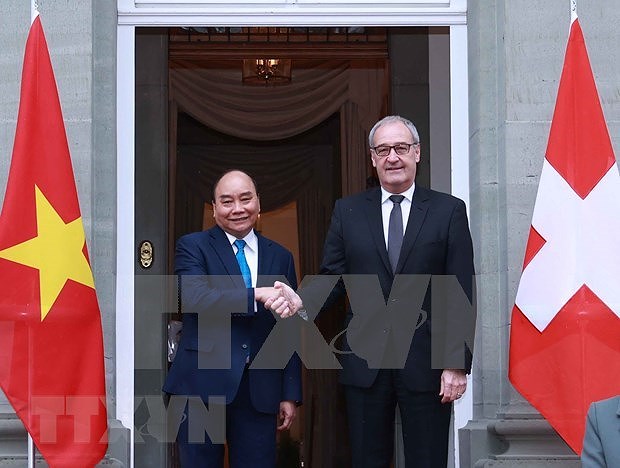 President Nguyen Xuan Phuc (L) meets his Swiss counterpart Guy Parmelin (Photo: VNA)
President Nguyen Xuan Phuc (L) meets his Swiss counterpart Guy Parmelin (Photo: VNA) – President Nguyen Xuan Phuc's visits to Switzerland (from November 25-29) and Russia (from November 29-December 2) were a success with specific outcomes, Deputy Foreign Minister To Anh Dung said in an interview granted to the press following the visits.
In Switzerland, the two sides reached high consensus on measures to bolster their ties both bilaterally and multilaterally, while sharing views on strategic issues in the region and the world, including the importance of maintaining peace, stability, and maritime security and safety in the East Sea in accordance with international law, Dung said.
He went on that the visit created a new motivation for the Vietnam-Switzerland economic cooperation, noting that President Phuc and his Swiss counterpart Guy Parmelin attended the Vietnam-Switzerland business forum that gathered more than 100 enterprises of both sides, and witnessed the signing of many cooperation deals in different areas.
According to the deputy minister, during all meetings, Swiss business people affirmed that Vietnam is a priority economic partner which plays an important role in both regional and global supply and production chains.
He said the two sides also reached a common orientation for a more effective implementation of joint activities in science-technology and innovation through the upgrading of a letter of intention to a governmental agreement on cooperation in the field, looking toward a partnership on innovation.
Multilateral relations were also a focus of President Phuc's trip to Switzerland, Deputy FM Dung said, stressing that within less than 24 hours in Geneva and despite it being a Sunday, the Vietnamese State leader had met with the UN Under Secretary-General and leaders of several major international organisations such as the World Trade Organisation (WTO), the World Health Organisation (WHO, the World Intellectual Property Organisation (WIPO), and the International Federation of Association Football (FIFA).
He said that during the meetings with President Phuc, the foreign leaders had made important commitments on cooperation with and support for Vietnam. The WHO pledged to continue helping Vietnam in COVID-19 prevention and control, especially in vaccine provision through COVAX Facility, while the WIPO will assist Vietnam in implementing the national intellectual property strategy and improve the capacity of national and local innovation systems.
President Phuc’s visit to Russia is also a great success in all aspects, underlined Dung.
The President met with all top leaders of Russia, including President Vladimir Putin, PM Mikhail Mishustin, Chairman of the Russian Duma, Speaker of the Federal Council of the Federal Assembly of Russia, and Deputy Chairman of the Security Council of the Russian Federation Dmitry Medvedev.
The deputy minister said the joint statement on the vision of Vietnam-Russia comprehensive strategic partnership by 2030 which was issued following a four-hour talk between the two Presidents reflects the high determination of both sides in opening up a new development period in bilateral cooperation across all fields.
According to Dung, basing on the firm foundation of the bilateral ties and the results of this visit, the two countries' cooperation will focus on the following directions: maintaining dialogue and political trust and closely coordinating to deal with arising issues during their cooperation; making a breakthrough in economic-trade partnership; expanding and enhancing the efficiency of collaboration in traditional fields and strengthening cooperation in new areas such as high technology, infrastructure development, industry, agro-forestry-fisheries, and local coordination; reinforcing ties in other areas such as defence, security, education-training, culture and health care; and beefing up cooperation in regional and international issues as well as in responding to traditional and non-traditional challenges on the principle of respect for international law, equality and mutual benefits./.
VNA